The State of the Legal Industry in 2023
January 2023
By
Susan Jacobson

Reflections on 2022 and How Key Trends Are Impacting the Year Ahead
Our take on in-house legal department challenges in 2022, what potential pressures await legal leaders in 2023, and most importantly, how to prepare.
If 2022 could be summed up in just one simple word, it would be “uncertainty.” Savvy GCs learned through the two years leading up to 2022 that pivoting budgets and business strategies toward a more flexible and fluid spending approach was the best way to proactively prepare for uncertainty. They navigated the transition into the post-Covid world through a Great Recession, the Great Resignation, then toward record inflation, only to end the year with a looming potential recession. The legal field was challenged; however, it also adapted, innovated, and endured. Here we explore the major themes we saw most legal leaders at both SMB and enterprise businesses face, and how they overcame their challenges.
Axiom has been uniquely positioned to hear solutions to the biggest issues impacting legal from hundreds of legal leaders across the globe and from every major industry, both through our clients and the talent with whom they partner to overcome these unanticipated challenges.
For all the uncertainty 2022 brought us, we feel optimistic and better prepared for what’s to come in 2023. Here’s what we (and successful legal leaders) have learned:
- The importance of staying financially nimble through budgeting flexibility and cost reduction
- How to anticipate and reduce attrition by:
- Learning why quality talent are leaving
- Addressing satisfaction and burnout
- Balancing values and risk through mission statements
- How to adapt to digital strategies as the legal marketplace evolves
Embracing Budget Flexibility and Cost Reduction
Unsurprisingly, concern about costs has been at the forefront of most GCs’ business concerns. With budgets strained or cut, compounded with legal matters increasing in both volume and complexitywait no how, when, and where they spend their money has been more important than ever. Specifically, they need to continue providing quality legal services without spending more. Over the last year, many asked themselves: when do we really need the expense of a law firm?
We’ve stated this time and again: we all know elite law firms will always have a place in the legal resourcing environment. However, the traditional legal resourcing strategy has often just been a two-pronged approach: staff up (invest in internal resources) or send out (hire an external law firm). Often, GCs struggling to meet increased workload demands without spending all their budget on expensive firms turn to in-house hires for business-as-usual matters. While it seems like a cost-efficient solution, many legal leaders realize they’re losing ROI by investing heavily in internal resources.
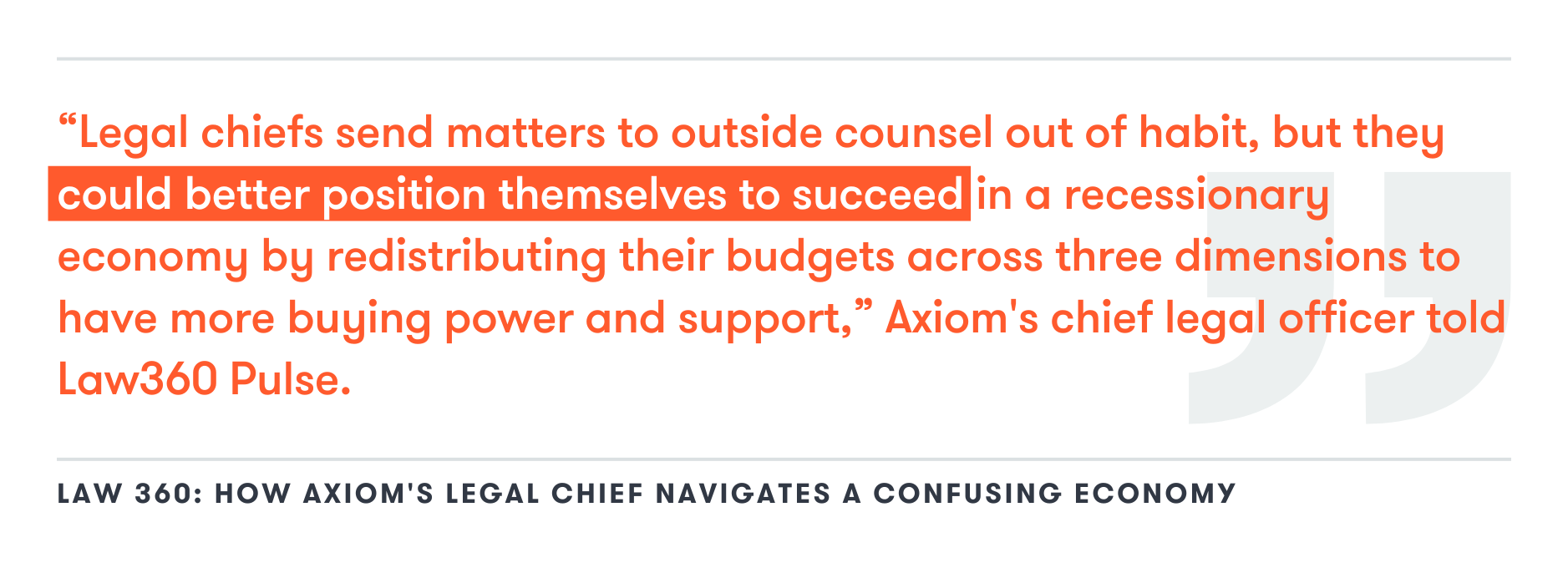
That’s why in 2022 when GCs needed to consider cost variability and savings during economic volatility, those who were successful in keeping budgets tight while still providing quality legal service embraced the Core-Bench-Firm (CBF) model. With CBF, the GC utilizes Axiom to build a bench of flexible legal talent, improving risk mitigation by matching legal matters to the right legal talent only when needed (flipping the “on” switch). It allows the in-house talent to focus on their areas of expertise while limiting what is sent to expensive law firms. Researching through a proprietary calculator allows GCs to identify hidden in-house hiring expenses and compare fixed legal talent costs to flexible resources. On-demand legal professionals not only optimize spend, but also minimize risk while maximizing the value of the in-house legal team.

While successfully innovative GCs know to remain flexible with their budget throughout the year, the budget season is a vital period to focus efforts looking back over the previous year, while somehow trying to anticipate the upcoming year’s needs. The uncertainty of 2022 has caused 2023 preparations to be more difficult for legal leaders, but as we saw over the past couple of years, those GCs who embraced a flexible legal budgeting model were better able to manage unexpected budget cuts and unanticipated inflation impacts.
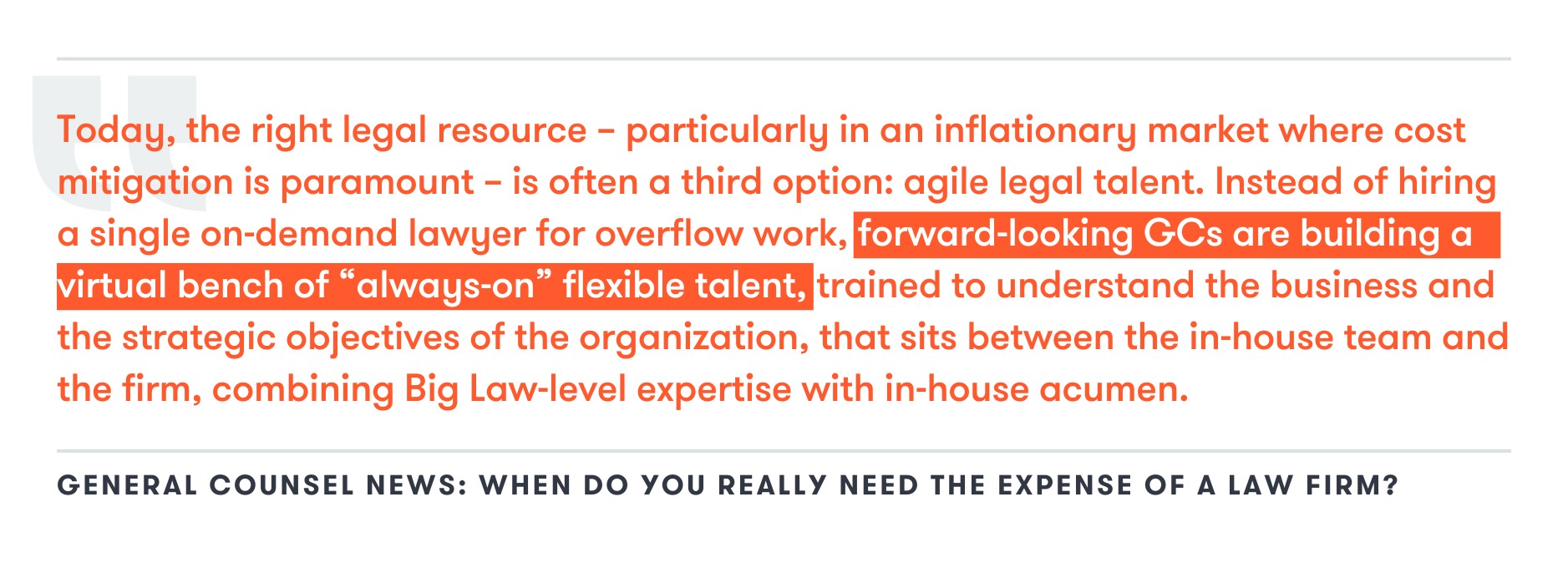
That’s where flexible GCs learned to lean on Agility-Based Budgeting (ABB), along with Agility-Based Forecasting (ABF), which expands upon the aforementioned CBF model. This allows GCs to achieve more value, more easily, for every budgeted dollar.
"Innovative GCs are leveraging a more flexible and strategic budget process, Agility-Based Budgeting (ABB). This helps them lower spend on outside counsel, nurture and retain their teams, and access a fuller universe of expert legal talent on an agile and cost-efficient basis. They know they can't predict the future with precision—and they know they don't need to, either. ABB provides GCs with the ability to navigate all sorts of scenarios without breaking the bank or burning out their people… It starts with a fundamental question: Where can we transition law firm spend and move fixed costs to variable ones? Agile legal talent is the answer." Bloomberg Law: Building a Better Legal Budget
Also concerning is that 98% of law firm managing partners are planning to increase their billing rates in 2023 by a record-breaking 7-8%, which is something that seems out-of-step in an economy forcing GCs to cut their budgets by 5-20%. Due to this, it seems like the first-time in-house leaders are actually ready to reject the old binary ‘staff up or send out' (to law firms) paradigm. This will finally be the year GCs are not only frustrated enough, but also empowered enough, to let their actions do the talking. There are five reasons why 2023 will become the year that in-house leaders use their leverage to meaningfully transform the traditional legal resourcing model. One, of course, is the historically large law firm rate increase. We need to also consider paying more, but with smaller firm resources (due to layoffs or attrition), the economic context previously discussed, and that both the volume and complexity of work have ballooned. Engaging flexible legal talent is the solution.
Resources for you to learn more about both the CBF and ABB models and how to optimize legal resources in your budget spending, especially during times of economic uncertainty:
Axiom resources:
- Whitepaper: When Do You Really Need the Expense of a Law Firm?
- Article: Do You Really Need the Expense of a Law Firm in an Inflationary Economy?
- Whitepaper: 2023 Legal Budgeting: Budget Building for a (Potential) Recessionary Economy
Legal trade publications:
-
Byline by Catherine Kemnitz, Axiom’s Chief Legal Officer in General Counsel News: When do you really need the expense of a law firm?
-
Q&A with Catherine Kemnitz in Law 360: How Axiom's Legal Chief Navigates a Confusing Economy
-
Bloomberg byline by David Pierce, Axiom’s Chief Commercial Officer: Building a Better Legal Budget
-
Bloomberg byline by David Pierce: Six Steps for Implementing Agility-Based Budgeting
-
Legal Dive article: Legal departments turn to flexible talent platforms to meet staffing, project needs
- The Future of Legal podcast featuring David Pierce: What it Takes to Stay in the ALSP Game
- LegalFutures byline by Daniel Hayter, Axiom’s Managing Director for Europe: Removing the ‘A’ from ALSPs
- LexisNexis article: Rise of the Legal Consultants
- Byline by David McVeigh, Axiom CEO: Enough is Enough: 5 Reasons Why 2023 Will Be Legal’s Tipping Point
Addressing and Reducing Legal Department Attrition
Even before the Great Resignation was a phrase (or a concern), a study of 150 UK-based corporate attorneys across all levels of seniority found that lawyers have a growing interest in alternative career journeys and are seeking new ways to gain and expand upon diverse skill sets and knowledge. The survey revealed shifting perspectives on traditional career paths and trajectories. While some of the shifts were exacerbated by the pandemic, the overall trend is consistent with what Axiom has witnessed in the legal services marketplace for a long time: an increasing yearning among lawyers and other legal professionals to gain more control and autonomy over their careers and build customized paths that align with their personal and professional goals. This led Axiom to delve deeper into the career aspirations of its U.S. counterparts during the peak of legal department turnover.
"Sara Morgan, senior vice president of legal talent at Axiom, said flexible talent providers lie at the intersection of the 'critical shift' taking place within the legal industry and respond to how lawyers want to work and how clients want to procure legal services. 'Everyone knows that the legal profession is changing by embracing digital transformation and adopting techniques from other sectors such as agile working. It’s happening as part of a wider effort to align with changing client-side demand for increased focus, flexibility, responsiveness and proof that legal services deliver quantifiable value’ she said." Global Legal Post: Half of UK Corporate Lawyers Expect to Leave Their Job Within Two Years, Report Finds
Anticipating Flight Risks and Reducing Chances of Attrition
By the fall of 2022 “The Great Resignation” was a commonly (over)used phrase, thrown around within virtually every industry, including the legal sphere. The mass exodus of U.S. workers from their jobs led to reevaluating and reshuffling of priorities and business practices by many leaders, including GCs. Here at Axiom, we refer to this period of 2022 as the “Great Reflection,” as lawyers everywhere reevaluated their priorities in a post-Covid world.
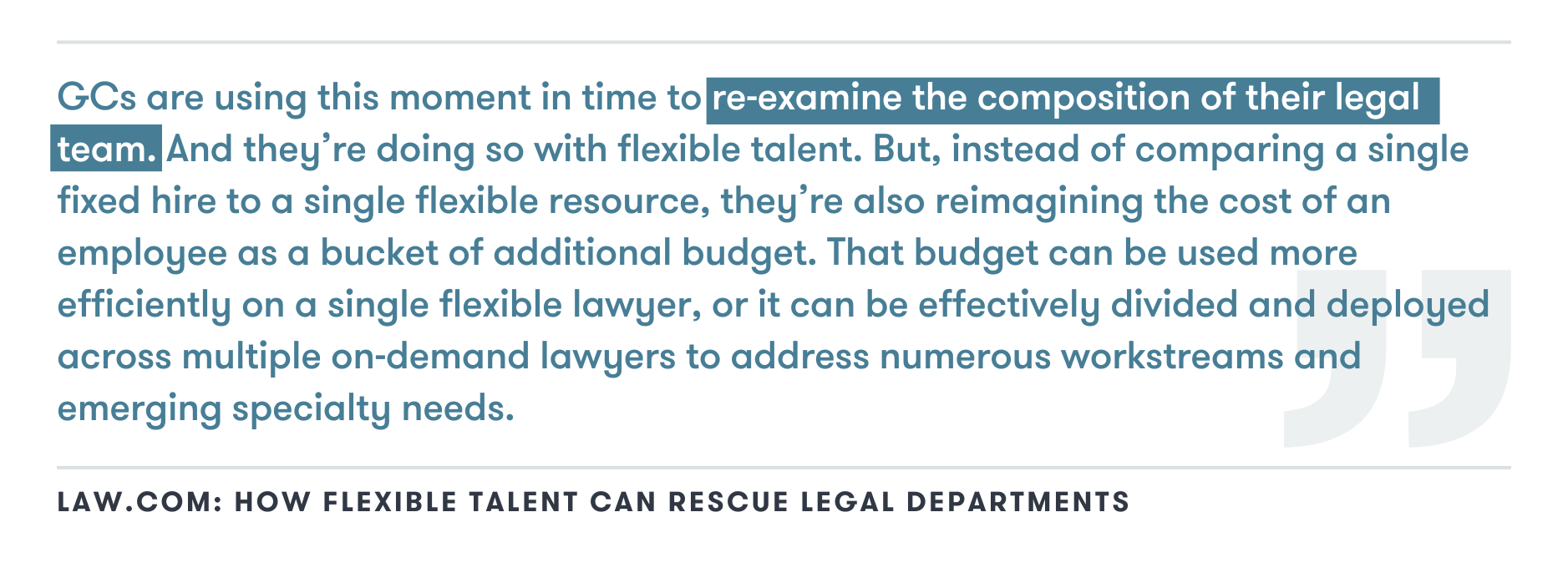
In the “View from Inside,” our industry survey report of 300+ in-house lawyers working across various enterprises, practices, and industries, we sought to understand their perspectives on their current roles and career trajectories. Findings indicated most in-house counsel are not satisfied in their position due to multiple factors, including insufficient staffing/resources to meet increasing workloads, misalignment with department goals, and unengaging/challenging work.

The survey also found that in-house lawyers have reevaluated their priorities since the pandemic and the start of the Great Reflection. As a result, most lawyers surveyed are interested in finding a new position outside of their department, with many actively looking now, regardless of high or low satisfaction. That should be problematic for in-house leaders who are already struggling with additional workload, reduced budgets, increasing attrition, and difficulty finding/hiring internal lawyers to help meet the demands placed on their stretched-thin teams.
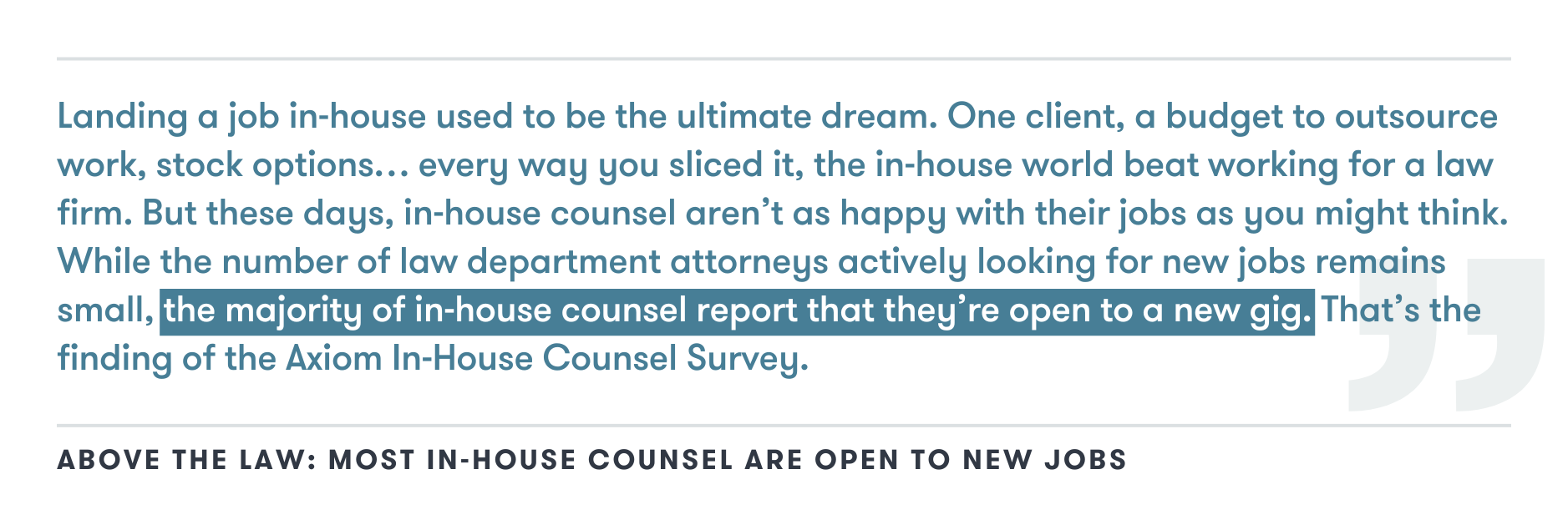 "'If I’m an in-house leader, I’m concerned about this report,' said Sara Morgan, global head of legal talent at Axiom in New York. 'What it’s telling me is that more than half of my legal team could be considered a flight risk, with replacements being really hard to find and even harder to actually hire. The grunt work still needs to get done, but, at the same time, legal chiefs should be talking to their talent to figure out, ‘How can I give you more exciting projects?’” Morgan said. 'This survey would say that they [GCs] need to spend some time with their teams and make sure that they are thinking about their careers on an individual level and engaging with those individuals on what is it that they want next in their career,' she added." Corporate Counsel/Law.com: In-House Lawyers Are Stressed and Want to Walk Out, New Survey Says
"'If I’m an in-house leader, I’m concerned about this report,' said Sara Morgan, global head of legal talent at Axiom in New York. 'What it’s telling me is that more than half of my legal team could be considered a flight risk, with replacements being really hard to find and even harder to actually hire. The grunt work still needs to get done, but, at the same time, legal chiefs should be talking to their talent to figure out, ‘How can I give you more exciting projects?’” Morgan said. 'This survey would say that they [GCs] need to spend some time with their teams and make sure that they are thinking about their careers on an individual level and engaging with those individuals on what is it that they want next in their career,' she added." Corporate Counsel/Law.com: In-House Lawyers Are Stressed and Want to Walk Out, New Survey Says
The survey also found that virtually all in-house legal counsel (99%) report that both the volume of legal matters with which they are dealing as well as the complexity of those matters have increased considerably over the past few years. Legal leaders can rethink their approach to legal resourcing by building an always-on bench of on-demand talent with a variety of specialty experience to support this increased workload. It not only helps address emerging risks, but it also helps spend-constrained leaders get more value from every budgeted dollar by transitioning costs from fixed (permanent hires) to flexible (on-demand lawyers).

Legal leaders need to be proactively considering the potential for their in-house teams to become flight risks in 2023. GCs can get ahead of increasing attrition now by evaluating how and when to use flexible talent to address the bandwidth issues that will inevitably arise from loss of in-house talent and the challenges that come with replacing those lawyers. Our survey report found almost half (41%) reported their department does not have the appropriate level of legal staffing, bandwidth, or resources to address company needs. These issues are being compounded by ballooning workloads and emerging legal risks. Smart GCs use flexible staffing to cost-efficiently support their legal departments, alleviating burnout and increasing job satisfaction.
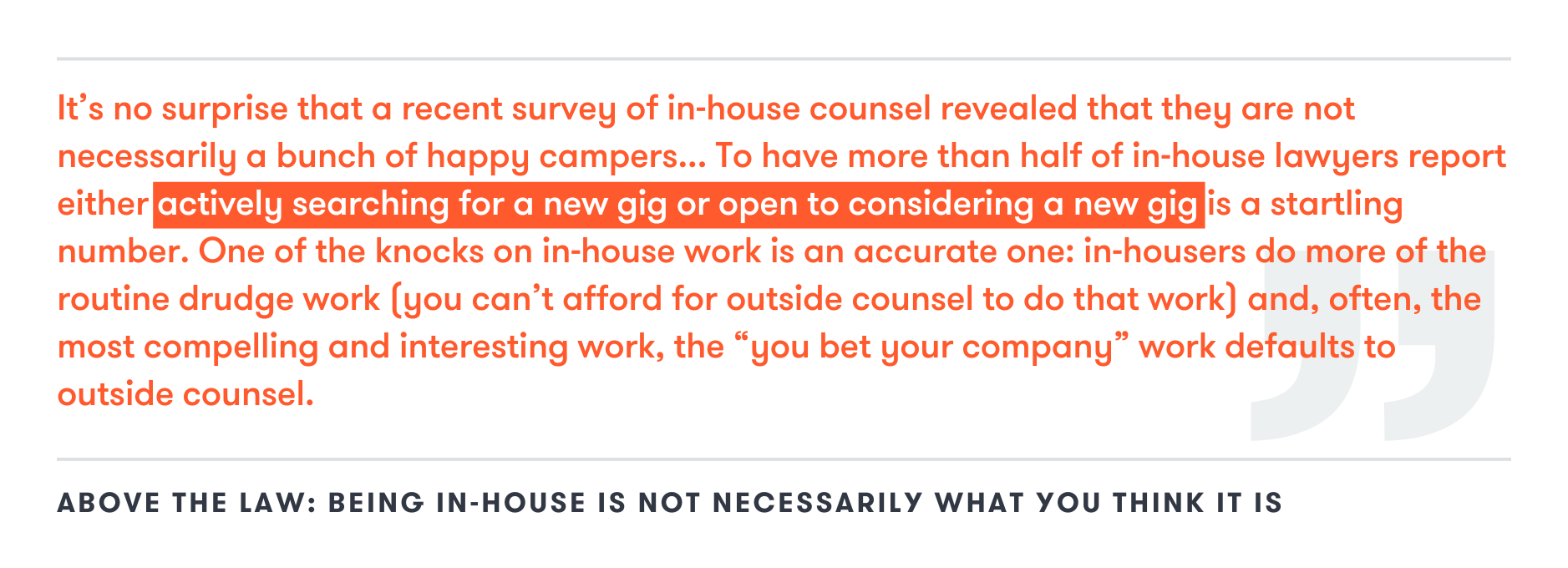
As we predict attrition will still be a critical concern for legal leaders in 2023, flexible legal talent providers can be a valuable solution for leveraging the cost of outside legal spend. The question becomes: how can legal teams prepare for the new challenges of increasing labor-related legal matters?
Through flexible legal talent, GCs can build a structured team to handle labor and employment issues, eliminating the expense of law firms, while also providing access to lawyers who can bring appropriate subject matter expertise (from an in-house perspective). Structured teams are comprised of flexible legal talent who are available to tackle L&E work when needed, as needed.
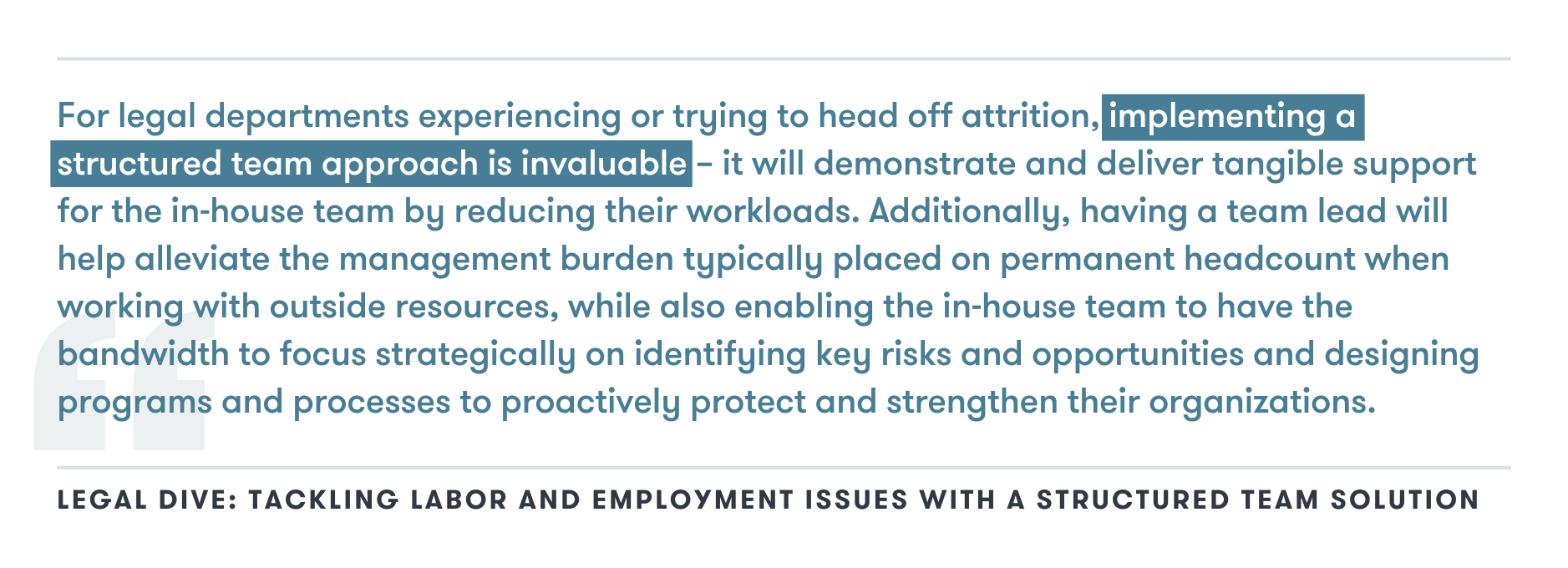
Prioritizing Mission Statements During Times of Volatility
In 2022, commercial leaders have dealt with problems like sharp shareholder and regulatory scrutiny, a volatile economy, supply chain issues, and more — all of which threatened their efforts to maintain profit. GCs are at the center of a tug-of-war between protecting their organization against escalating jeopardy and the need to support its fiscal goals, and legal’s role has become more and more prominent in navigating the corporate response to emerging risks and market opportunities. Beyond the GC, how does that impact the broader legal team? And as we move into 2023, what does this mean for in-house legal talent and those interested in in-house legal careers?
At the end of 2021, Axiom surveyed over 200 GCs to gain a better understanding of how Covid impacted legal leaders trying to reconcile changing business objectives and demands with the values of their department and broader organization. The majority (85%) of GCs surveyed believed their department has a moral responsibility to be the primary driver of company values, and almost as many (79%) said they must serve as the conscience of the company. The survey also found that only 40% had a documented mission statement, even though the prioritization of cost reduction over core department values was significantly lower among those legal departments with a mission statement (58%) than those without (75%).

We anticipate in 2023 GCs will hold their teams to higher standards, hold them accountable, and provide analytical metrics. Decisions made within legal departments are tied to department values, and economic volatility and inflation have forced GCs to prioritize budget over values.

Resources for you to learn more about our survey findings of the career aspirations of both UK and US lawyers, and how in-house leaders can mitigate attrition and burnout, as well as diminish the need to sacrifice corporate values for cost:
Axiom resources:
-
Survey report: New Life in The Law (UK)
-
Survey report: The View from Inside: Axiom's 2022 In-House Counsel Survey Report
-
Survey report: The View from Inside: The So What
-
Survey report: Corporate Conscience at Stake: 2021 Axiom GC Survey Report
Legal trade publications:
- Legal Brief article: Almost half of UK lawyers looking for next career move
- The Global Legal Post article: Half of UK corporate lawyers expect to leave their job within two years, report finds
-
Law.com/New York Law Journal byline by Sara Morgan, Axiom’s SVP of Legal Talent: How Can Flexible Talent Rescue Legal Departments from the Great Resignation?
-
The Lawyer article: The ALSP model is a proven success
-
Corporate Counsel/Law.com article: In-House Lawyers Are Stressed and Want to Walk Out, New Survey Says
-
Law 360 article: Most in-house attorneys want new jobs, citing stress, demands
-
Legal Dive article: Nearly 80% of in-house lawyers report being stressed or burned out
-
Above the Law article: Most In-House Counsel Are Open To New Jobs
-
Above the Law article: Being In-House Is Not Necessarily What You Think It Is
-
Artificial Lawyer article: 47% of Inhouse Counsel Are Burned Out, But They’re Not Leaving: Why?
-
Legal Dive article: In-House Counsel Jobs Have Become Far More Demanding
-
Legal Dive byline by Charlie Sandel, Axiom’s Senior Client Advisor: Tackling Labor and Employment Issues with a Structured Team Solution
-
Law 360 byline by Catherine Kemnitz, Axiom CLO: To Retain Talent, GCs Should Prioritize Mission Statements
Embracing a Digital Marketplace Sets GCs Up for Success
Legal leaders are finally ready to embrace a digital marketplace. We, as consumers, live in a world where almost everything can be purchased through our fingertips. Yet up until recently, the mindset of in-house lawyers has more often been to make legal hiring and buying decisions through more traditional means. In an uncertain and volatile environment, that just doesn’t work anymore. To be progressive, cost-effective, and get quality work done at a faster pace, GCs learned in 2022 that their legal departments must bring the digital marketplace into their resourcing strategies.
Both Axiom-owned and external data highlight this need from GCs. Axiom’s own research among our clients shows that GCs in organizations with over $10B in revenue, 79% stated they’d be interested in engaging lawyers directly through a digital platform. In addition to our findings, a report by McKinsey finds that 77% of GCs are open to previewing and/or end-to-end buying of lawyers through a vetted digital experience.
Both the Axiom and McKinsey research prove there is a significant population of legal leaders who are eager for a digital platform to search for, browse, connect with, procure, and hire vetted, experienced legal talent.
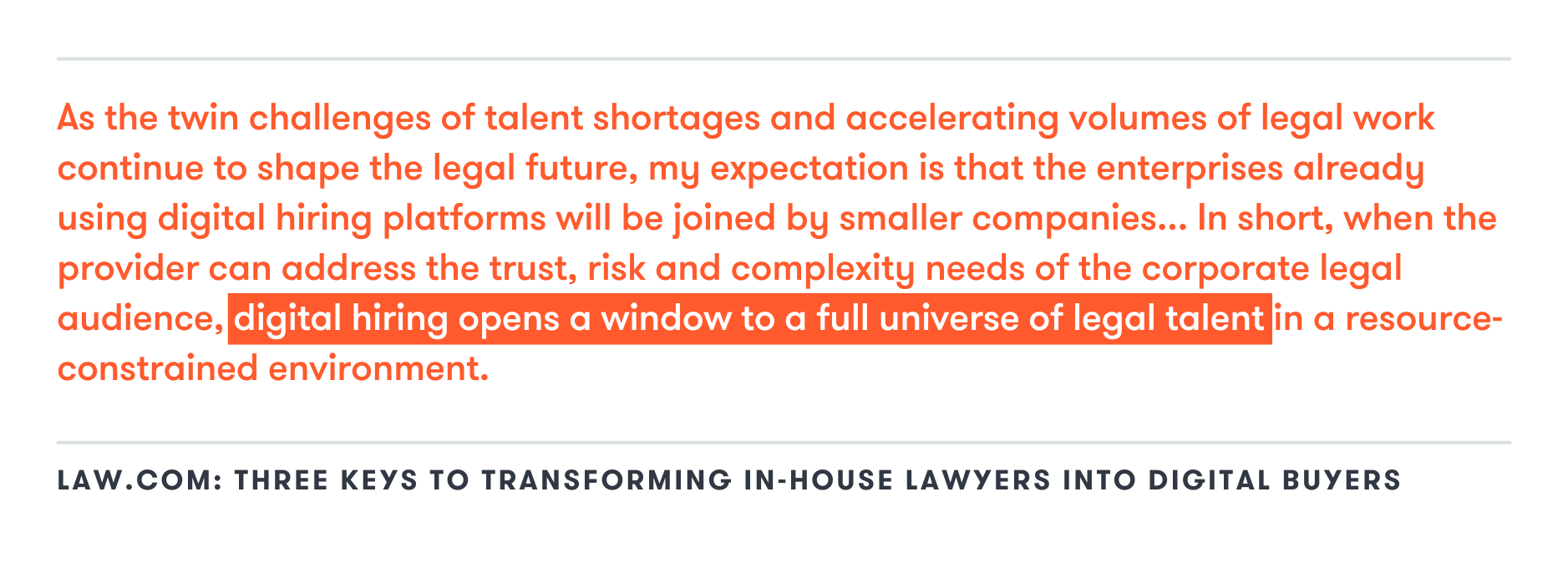
The four most important benefits for hiring lawyers through a digital platform are to 1) improve risk mitigation by matching legal matters to the right legal talent, in the moment, especially during market volatility; 2) increase speed to hire by enabling in-house teams to search, find, communicate with, hire, and onboard legal talent immediately through a seamless digital platform; 3) extend in-house expertise by limiting what needs to be sent to a law firm; and 4) minimize costs by decreasing law firm spend and unwarranted permanent in-house hires.
"Pierce said technology is an area where Axiom has invested 'tens of millions of dollars' in recent years. The spending paved the way for the creation of Axiom’s Access Legal Talent platform, which is aimed at making it easier for companies to quickly find attorneys who can meet a wide array of legal needs. 'It gives them the ability to skip the human conversation and move right into searching, sorting, and engaging with talent directly through digital means,' Pierce said.
Axiom has also invested funds in improving the digital functionality for its attorneys who advertise their services on the platform. The upgrades give attorneys more control of how they digitally curate and manage their Axiom careers, according to Pierce." Legal Dive: Narrowing Its Focus Has Fueled Legal Talent Platform’s Growth
Resources for you to learn more about how innovative GCs can use digital platforms in their hiring strategies:
Axiom resources:
-
Whitepaper: Will In-House Lawyers Ever Really Be Digital Consumers?
-
Article: Four Benefits of Hiring Lawyers Through a Digital Platform
Legal trade publications:
- Law.com byline by Derek Kan: Three Keys To Transforming In-House Lawyers Into Digital Buyers
- Legal Dive interview with David Pierce, Axiom’s Chief Commercial Officer: Narrowing Its Focus Has Fueled Legal Talent Platform’s Growth
Conclusion
While 2022 may have been the year of uncertainty, we’ve learned legal leaders are resilient and progressive, indicating 2023 will be a year of success. Innovative GCs and their legal teams will be prepared for whatever comes their way this year using flexible and purposeful budgeting, anticipating and preventing attrition, and embracing new digital legal platforms. It’s all about working smarter, adapting faster, and going further.
💡 Equip your legal department with the strategies needed to thrive in a rapidly changing landscape.
Posted by
Susan Jacobson
Susan Jacobson serves as Senior Client Advisor for Axiom. She was formerly General Counsel at Paylocity and Deputy General Counsel of Cardinal Health.
Related Content
From DGC to GC: Climbing the Last Rung of the Legal Ladder
Read Axiom's survey report which examines how DGCs can advance their legal careers to the GC role.
Navigating Generative AI: Three Big Takeaways for In-House Legal Teams
Isha Marathe, Legal Tech Reporter at ALM’s Legaltech News, covered Axiom’s recent webinar, AI & Data Privacy: Emerging Trends for In-House Counsel.
Navigating Legal Budgeting in Uncertain Times: Four Insights for 2024
Legal experts share actionable tips for in-house legal leaders as they navigate their 2024 budgeting strategy during uncertain times.
- Expertise
- North America
- Legal Department Management
- Must Read
- Perspectives
- Work and Career
- State of the Legal Industry
- Legal Technology
- Solutions
- Spotlight
- Artificial Intelligence
- Regulatory & Compliance
- Data Privacy & Cybersecurity
- United Kingdom
- General Counsel
- Legal Operations
- Australia
- Central Europe
- DGC Report
- Labor & Employment
- Banking
- Commercial & Contract Law
- Diversified Financial Services
- Hong Kong
- Intellectual Property
- Investment Banking
- Large Projects
- News
- Regulatory Response
- Singapore
- Technology


